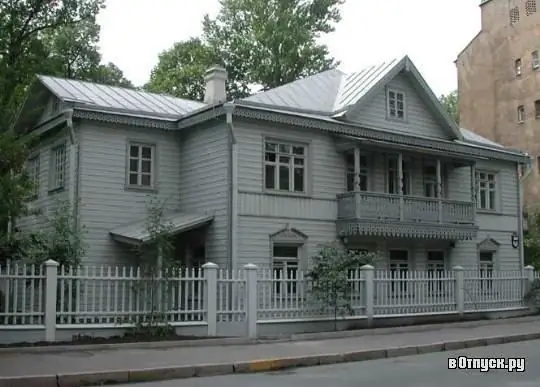
Description of the attraction
2006 in St. Petersburg was marked by a significant event in the cultural life of the city - the M. V. Matyushin. It stands on Popov Street (formerly called Pesochnaya). The house was built in the 40-50s of the nineteenth century. Then it belonged to the Literary Fund. The building was rebuilt several times.
From 1891 to 1899, the journalist and writer V. O. Mikhnevich, after his death the widow sold the house. In 1904, the building was again acquired by the literary fund. In 1912, the founder of Russian avant-garde art, a teacher, musician, author of the theory of "extended viewing", artist and publisher Mikhail Vasilyevich Matyushin, lived in apartment number twelve. Together with him lived Elena Genrikhovna Guro, a well-known writer and artist in her time.
For several decades, Matyushin's house became the center of culture and spirituality in Petrograd, and later in Leningrad. Within its walls, musicians, artists and writers united and worked. In the first decades of the twentieth century, A. E. Kruchenykh, K. S. Malevich, V. V. Mayakovsky, P. N. Filonov, V. V. Kamensky, V. V. Khlebnikov, Ender sisters and brothers, Burliukin brothers, N. I. Kostrov, V. E. Delacroa, E. S. Khmelevskaya, O. P. Vaulina, E. M. Magaril, E. Ya. Astafieva, I. V. Walter, V. P. Besperstova. This list of names can be continued for a long time.
When the war with the Nazis was thundering and Leningrad was in a blockade, the fame of the house and its role in the formation of Russian culture saved it from being scrapped for firewood. By the decision of the regional party committee, it was decided not to dismantle Matyushin's house, thanks to which the building then retained its historical appearance. During the wartime, N. S. lived and gathered in the house at different times. Tikhonov, A. A. Fadeev, V. M. Inber, A. A. Kron, M. A. Dudin.
Matyushina's widow Olga Konstantinovna lived in the house until 1975, thanks to her the furnishings of the apartment, graphics and painting of E. G. Guro and M. V. Matyushin. All this was subsequently acquired by the Museum of the History of Leningrad for exhibitions.
In 1977, the Leningrad City Executive Committee decided to transfer the house to the State Museum of the History of Leningrad. And already in the summer of 1979, the tenants were moved to other apartments, and the house was given to the museum.
In 1987 the house was dismantled and reconstructed. A fire that took place in 1990 severely damaged the log house. In 1995, the production of a new log house was completed. The lack of funding prevented the completion of the finishing work for four years. Since 1999, restoration work has been carried out in the house and, finally, at the beginning of winter 2006, the museum reopened its expositions for visits. The museum contains a large collection of graphics, paintings, photographs, books, brochures, manifestos, memorial items and various unique materials that are somehow connected with the formation and development of the avant-garde art movement in 1910-1930 in Russia.
The unique exhibits of the museum make it possible to explain all the originality and originality that the Russian avant-garde has. Its phenomenon is that the work of avant-garde art itself was not as important as the very process of its creation. In the first place has always been not the work, but the personality of the creator-artist-creator.
Next to the graphic works of E. Guro and M. Matyushin, N. Kulbin, A. Remizov, V. Sterlingov there are household items and materials from the State Museum of the History of St. Petersburg. Various schools of avant-garde art are represented (P. Filonov, K. Malevich and many others).
Museum visitors plunge into the avant-garde atmosphere that prevailed in the house on Peschanaya Street in the first decades of the twentieth century.






